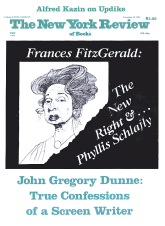The Reagan administration’s troubles are not yet sizable enough to justify the suspicion that the all-too-familiar process of the unraveling of presidencies may already have begun for this one.
But President Reagan’s difficulties are not small.
As performer he has always been immeasurably superior to the last three of his predecessors, which could be why his September broadcast effort to regroup and rally his constituents may only have seemed limper and indeed untidier than it really was.
The response of those commercial interests whose continued confidence he most needs to sustain his revolution was, in any case, too tepid to offer much hope of restoring his mandate to the refulgence of its beginning.
Every political movement, whether conservative or liberal, owes its success to its ability to maintain a coalition between the greedy and the idealistic. The president seems to be holding the idealistic conservatives; his problem is with the greedy ones, who are discovering that it can be distinctly more unpleasant to get than not to get what you think you want.
Reagan is both a troubled and a troublesome president because he insists, with the agreeability that makes him personally charming and the stubbornness that makes him institutionally offensive, upon acting as though he meant the promises he made before he was elected.
He is determined to destroy the welfare state and will go back to Congress with one more assault upon those items in the budget that represent payments from the federal treasury to the freeloading class.
What he persists in failing to notice is that the freeloading class is enormous and so permeates our economic order as to arouse the most powerful of personages against any attempt to dislodge it.
The American corporation is the most expensive ward of the welfare estate. As an idealist, the president detests every form of government regulation; but business is rather more selective in its likes and dislikes.
There is iniquitous regulation like the occupational health and safety codes; and there is splendid regulation like the licensing agreements and the route restrictions that the Interstate Commerce Commission serves up to the trucking industry to save it from the brand of free competition that it defines as “ruinous.”
There are farm price supports, there are tariffs to protect the automobile industry from its betters in Tokyo, and there are bail-outs for companies that would otherwise be casualties of the free market. There was even a $12 billion gift to an already sufficiently engorged oil industry in the last tax package.
These welfare handouts have reduced the incentive of their commercial beneficiaries to support themselves by hard work and competitive struggle; and their pervasiveness probably does much to explain the poor performance of industries that government long ago ceased to expect to shift for themselves.
When the president takes his budget cuts back to the Congress, he will learn that the welfare habit is even more stubborn than he.
He will have to deal with representatives of a constituency not only as disinclined to accept sacrifices as the rest of us but historically accustomed to avoiding them.
And he is almost bound to fail, because he faces the opposition of the very people who voted for him and are now disillusioned and made angry at finding out that he actually meant what he said.
Revolutions are fantasy. Government goes its way on an unalterable course, sometimves vaguely sympathetic and more often callous toward the deserving poor but always prostrate before the undeserving rich, who take and never even say thank you. A president continues to subsidize the American corporation and finds himself drowning in deficits; and then the American corporation proclaims its loss of confidence in any president who cannot balance his budget.
He can only harm those who do not count and must go on serving those who do; and, more often than not lately, presidents end up where Ronald Reagan may well be heading, mildly troubled by the resentments of the poor and painfully oppressed by the ingratitude of the rich.
This Issue
November 19, 1981



